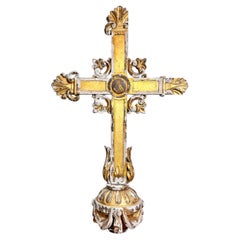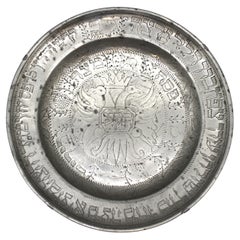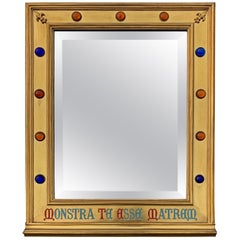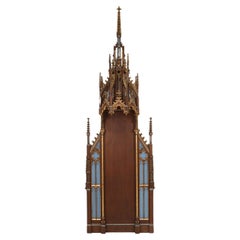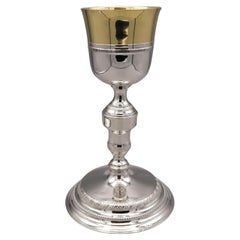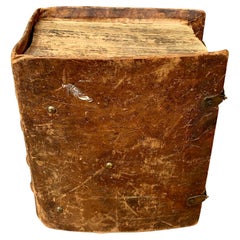1810s Religious Items
to
1
1
2
717
727
704
25
281
273
89
25
14
31
28
18
97
9
25
8
8
1
1
1
1
2
2
2
2
2
Period: 1810s
Circa 1810 Neo-gothic Giltwood Processional Cross on Orb
Located in Hastings, GB
Early 19th Century gilt wood Neo-Gothic processional cross, Germany circa 1810, mounted on an orb with carved swag detail, overlaid in gesso and gilt.
A rare example of the neo-go...
Category
German Gothic Revival Antique 1810s Religious Items
Materials
Gesso, Wood
A German Pewter Passover Plate, Circa 1810
Located in New York, NY
This charming and historically significant German pewter Passover plate, crafted circa 1810, is a poignant example of early European Judaica crea...
Category
German Antique 1810s Religious Items
Materials
Pewter
Related Items
Gothic Revival Gilt Brass on Wood Wall Mirror with Glass Stones and Latin Phrase
Located in Lisse, NL
For the collectors of rare, beautiful, meaningful and usable Gothic Revival antiques.
At the bottom of this strikingly colorful and stylish Gothic mirror is the Latin phrase Monstra...
Category
French Gothic Revival Antique 1810s Religious Items
Materials
Brass
$2,738
H 25 in W 20 in D 2 in
A French wooden neo-Gothic steeple with niche for saint statue, ca. 1800
Located in Meulebeke, BE
France / 1800 / Neo-Gothic steeple with niche for saint statue / wood / Neo-Gothic / 19t century
A very rare and large antique Neo-Gothic church steeple with niche for saint statue....
Category
French Gothic Revival Antique 1810s Religious Items
Materials
Wood
$19,047
H 145.67 in W 45.28 in D 19.69 in
Antique Gothic Revival Harp by Erard
Located in London, GB
Antique Gothic Revival harp by Erard
French, c. 1880
Height 178cm, width 54cm, depth 91cm
Of typical form by the famed instrument maker Érard. ...
Category
French Gothic Revival Antique 1810s Religious Items
Materials
Brass
Lehman Auto "Ito" Sedan, Germany, circa 1913
Located in Incline Village, NV
This hand-painted German tin toy was manufactured by the "Lehman Toy Company" in Brandenburg, Germany beginning in 1913. It was made for a number of ye...
Category
German Folk Art Vintage 1810s Religious Items
Materials
Tin
Ptolemaic Armillary Sphere Charles-François Delamarche Paris, 1805-1810 Circa
Located in Milano, IT
Charles-François Delamarche
Ptolemaic armillary sphere
Paris, circa 1805-1810
Wood and papier-mâché
covered with printed and partly hand-coloured paper
It measures 15.74” in height, ...
Category
French Empire Antique 1810s Religious Items
Materials
Paper, Wood
$10,694
H 15.75 in Dm 11.03 in
Fine 19th Century French Neo-Gothic Gilt Metal Cathedral Church Reliquary Pair
Located in Forney, TX
A stunning pair of very fine quality French Neo-Gothic gilt metal church reliquaries. circa 1860s
Most impressive objets d’art, born in France in the second half of the 19th century, most likely Parisian gilded bronze and brass ormolu work, exceptionally executed sculptural form, the exquisitely detailed architectural cathedral shaped case having a removable pointed steeple roof with cross finial, opening to relic display case surrounded on all sides by original glazed glass panes, stepped base, rising on disc feet. Signed, stamped by maker / bronzier "BC" (unknown) model "5096" and other faint marks to lid interiors.
Additional photos available upon request
Dimensions: (approx)
14.75" High, 6.75" Wide, 6.75" Deep; 13.25 lbs total
History:
A reliquary (also referred to as a shrine, by the French term châsse or monstrance) is a container for important religious relics.
The earliest reliquaries were essentially boxes, either simply box-shaped or based on an architectural design, taking the form of a model of a church with a pitched roof. These latter are known by the French term chasse, and typical examples from the 12th to 14th century have wooden frameworks with gilt-copper plaques nailed on, decorated in champlevé enamel. Limoges was the largest production centre; NB the English usage differs from that of the French châsse, which denotes large size rather than shape.
Relics of the True Cross became very popular from the 9th century onward and were housed in magnificent gold and silver cross-shaped reliquaries decorated with enamels and precious stones. From about the end of the 10th century, reliquaries in the shape of the relics they housed also became popular; hence, for instance, the skull of Pope Alexander I was housed in a head-shaped reliquary. Similarly, the bones of saints were often housed in reliquaries that recalled the shape of the original body part, such as an arm or a foot.
A philatory is a transparent reliquary designed to contain and exhibit the bones and relics of saints. This style of reliquary has a viewing portal to view the relic inside. The feretrum was a medieval form of reliquary or shrine containing the sacred effigies and relics of a saint.
During the later Middle Ages, the monstrance form, primarily used for consecrated hosts, was sometimes used for reliquaries. These housed the relic in a rock crystal, or glass capsule mounted on a column above a base, enabling the relic to be displayed to the faithful. Reliquaries in the form of large pieces of metalwork jewellery also appeared around this time, housing tiny relics such as pieces of the Holy Thorn, notably the Holy Thorn Reliquary now in the British Museum.
Condition:
Superb museum quality examples, in excellent original unrestored antique condition with beautifully aged patina. Wear consistent with age and use. Heavily patinated - scattered oxidation. Overall wonderful examples.
Typically reliquaries were not sold in pairs, so to find a matching pair such as this is exceptionally rare.
Worldwide shipping available
Local pickup available near Dallas, Texas
Additional:
We here at Lynx Hollow Antiques love religious antiques, from Christian tabernacles, Catholic altarpiece, life-size Buddhist temple sculptures, Hindu votive offerings, 16th century Islamic mosque architectural salvaged windows...
Category
French Gothic Revival Antique 1810s Religious Items
Materials
Brass, Bronze
$6,500 / set
H 14.75 in W 6.75 in D 6.75 in
Fine Gothic Painting / 2nd Station Crucifixion, Jesus Takes Up His Cross
Located in Lisse, NL
Another stunning hand-painted oil on canvas work of religious art.
This antique oil painting was first hand-painted on canvas and later mounted onto a zinc backplate .. a traditiona...
Category
European Gothic Revival Antique 1810s Religious Items
Materials
Iron, Zinc
$1,964
H 30 in W 14.5 in D 1 in
Antique Greek Goddess Plaque Bas Relief Neo-Gothic Revival 29cm
Located in Poperinge, BE
Beautiful antique gilt bronze plaque in bas relief of a Greek goddess depicted with wings, probably the goddess Clio, the plaque is mounted on a hardwood carving in neo-Gothic reviva...
Category
European Gothic Revival Antique 1810s Religious Items
Materials
Bronze, Gold Leaf
Antique Dollhouse Pewter Bird Cage with Bird, By Babette Schweizer, Germany
Located in Nuernberg, DE
An outstanding bird cage in painted soft metal with a colorful Bird. To hang in your dollhouse or to put on a table in a salon or a parlor.
Made of pewter. Nice for every decoration...
Category
German Art Nouveau Vintage 1810s Religious Items
Materials
Glass
Antique Scandinavian Bible, Norway 1810
Located in Hønefoss, 30
A beautiful antique bible from Scandinavia in the year 1810. The cover are probably even older, possibly late 1700s.
Works perfect as a Wabi Sabi decoration element to give the r...
Category
Norwegian Romantic Antique 1810s Religious Items
Materials
Paper
Russian Icon with Processional Cross 19th Century
Located in Brussels, Brussels
Very beautiful Russian icon with a processional cross in its center from the 17th century
We can see that the icon was created to accommodate the processional cross with the Chris...
Category
Belarusian Aesthetic Movement Antique 1810s Religious Items
Materials
Wood
Large Cross Of The XIX Century Processional Or Altar
Located in Madrid, ES
Great Cross Of The XIX Century Processional Or Altar
LARGE NEO-ROMA STYLE BRONZE CROSS OF THE XIX CENTURY WITH DUAL USE: IT CAN BE USED BOTH IN PROCESSION AND AS AN ALTAR CROSS MEASU...
Category
Antique 1810s Religious Items
Materials
Bronze
$1,378 Sale Price
20% Off
H 82.29 in W 13.78 in D 3.94 in
Previously Available Items
Early XIX° Century Italian 800 Silver Liturgical Chatolic Chalice
Located in VALENZA, IT
XIX ° Century Italian silver Liturgical Chatolic Chalice.
The Chalice, smooth and very balanced in its shapes, is in Empire style and is characterized by the classic palmette design ...
Category
Italian Empire Antique 1810s Religious Items
Materials
Silver
Antique Swedish Leather-Bound Bible Book, 1810
Located in Haddonfield, NJ
Swedish leather-bound Bible, with brass brackets decorated with two hearts and two anchors. According to the estate in Sweden where I purchased this book, it belonged to a Scandinavi...
Category
Swedish Empire Antique 1810s Religious Items
Materials
Brass
Antique Print of the Pyramid of Cestius in Rome, Italy, 1814
Located in Langweer, NL
Description: Antique print titled 'The Tomb of Caius Cestius with the Gate of St. Paul'. Original antique print of the Pyramid of Cestius in Rome, Italy. This print originates from '...
Category
Antique 1810s Religious Items
Materials
Paper
Silver Pax, Manuel Aguilar and Diego De La Vega, Córdoba, Spain, 1816
By Manuel de Aguilar
Located in Madrid, ES
Portapaz. Silver in its color. Manuel Aguilar and Diego de la Vega, Córdoba, 1816.
With contrast marks.
Portapaz made of silver in its color with an architectural distribution of a pedestal with garlands and a shield with a Latin cross in the center, a central body with two pilasters with an Ionic capital and scrolls on the sides of a relief, and a top finish with architectural elements, scrolls and vegetal motifs, all of strong classicist influence. The relief mentioned is an Immaculate Conception, located on a crescent moon; in this area are the contrast marks.
The altarpiece composition of the piece was common in the examples of the 19th century, and it is necessary to highlight the lack of Rococo influence it presents. Compare, for example, with the pair of portapaces from the Parroquia de San Lorenzo (Córdoba, Spain) dated between 1816 and 1826 with a punch from Manuel Aguilar Guerrero and “… / VEGA” (instead of the Virgin, one presents a Sal Lorenzo ). Likewise, other works are conserved:adapter for silver basin...
Category
Spanish Neoclassical Antique 1810s Religious Items
Materials
Sterling Silver
Early 19th Century Habsburg Empire Silver Kiddush Goblet
Located in New York, NY
Handmade silver Kiddush goblet, Lemberg, Habsburg Empire, 1814
On square flowers-decorated base with three leaves shaped stem and engraved on the wine s...
Category
Austrian Antique 1810s Religious Items
Materials
Silver
Recently Viewed
View AllMore Ways To Browse
John Brown Bible
St Francis Of Assisi
Used Monstrance
Antique Quran
Jesus Healing
Reliquary Box
Russian Icon Mother Of God
Sacred Heart Of Jesus
Spanish Crucifix
Used Catholic Religious Statues
Antique Wood Rosary
Religious Altar Pieces
Religious Bas Relief
Sunburst Religious
Baroque Chalice
Pulpits Used
Russian Bronze Icon
Spanish Colonial Jesus
